Best Plants to Grow for Smoothie Lovers
As the weather warms up, many gardeners look forward to spending more time outdoors. Smoothies have become a popular springtime and summertime treat among health-conscious individuals, whether as a refreshing snack or as part of a meal. They are an easy way to regularly incorporate fruits and vegetables into your diet. Instead of buying frozen produce for your smoothies or going to a juice shop, which can be expensive, try growing a smoothie garden in your backyard. You may already have experience with themed gardens, such as pizza gardens and edible gardens. A smoothie garden is a type of edible garden, and many of the staple ingredients in smoothies can be conveniently grown and will last year-round.
Before starting, make sure you plant what you will enjoy putting in your smoothies. There is no use growing kale or spinach if you dislike the taste of smoothied leafy greens. In addition, make sure that your soil and climate is compatible with the type of plant you are planning to grow. Many popular smoothie ingredients are tropical, so these will have some more specific requirements. Many crops grow poorly in heavy clay soils or soils with poor drainage. If your soil is of subpar composition, we recommend you use raised garden beds or containers, which you can fill with desirable, curated soil. Vego Garden has a collection of smaller beds like the herb garden twin pack and kids garden kits for those seeking to grow herbs and other plants on a small-scale. With a little planning, you’ll soon have the necessary ingredients for a yummy smoothie to enjoy on the patio or in an air-conditioned living room. Have fun experimenting with various ingredients to create your own signature, nutritious smoothie mix.
- Strawberries
Strawberries are one of the most popular additions to smoothies. Delicious as the sole ingredient or blended in with other fruits, they are also an ideal choice to grow with kids! Strawberries are appealing to even the pickiest little eaters. They can be grown everywhere, from the ground, in raised beds, or even a pot on the patio. Raised beds are particularly well suited to growing strawberries, as they provide better drainage for this plant that needs to be watered every day. It is important that you plant them in a sunny location that gets 8 – 10 hours of sun each day and has good drainage or water management. Look for ever-bearing varieties that produce twice during the growing season, in late spring and again in fall, and don’t sprout runners.

- Raspberries
If you have a large plot of land, consider growing raspberries. A good source of antioxidants, minerals, and fiber, raspberries are also low in sugar and calories. Keep in mind that they grow in thorny thickets and can become invasive if not controlled and pruned regularly. Separate them far away from other berries, as they can spread pests and disease to other cultivated berry varieties. Avoid wet areas, as overly wet, boggy soil can cause root rot. If you’re growing raspberries in raised beds, make sure the container is at least 17 inches tall and 3 feet wide to ensure ample space. Raised beds are a good way to keep them contained.
- Blueberries
Blueberries are incredibly nutrient rich, with anti-aging and disease preventing properties. They have also been shown to improve brain function in children, particularly delayed memory and executive function. A versatile fruit that offers a sweet and tangy flavor, it has many uses other than smoothies, and any surplus fruit can be incorporated into desserts, yogurts, and acai bowls. Blueberries are one of the easiest fruits to grow in the backyard. Plant them in acidic soil with a pH between 4 – 5 in a sunny spot. Protect them from birds using bird netting.
- Carrots
Carrots are often used to offset the bitter taste of leafy greens and can serve as a refreshing addition to fruit smoothies, particularly with oranges. Although orange & carrot smoothies can be enjoyed during the summer, they can also be enjoyed during the colder months to alleviate colds. Carrots are high in vitamin A, while oranges are high in vitamin C. Try adding a small amount of cinnamon for an extra layer of flavor. The ideal soil for carrots is sandy loam that is free of rocks, which can cause them to become knobby or misshapen.
- Dragon fruit
For those seeking more exotic options, consider planting some dragon fruit on your deck or patio. Also called pitaya or strawberry pear, dragon fruit is actually a night-flowering cactus that requires a specialized trellis to support its water filled branches. Vego Garden’s dragon fruit rolling planter makes it easy to grow dragon fruit at home. Known for its vibrant fuchsia color and status as a superfruit, dragon fruit is rich in essential nutrients and minerals and supplies beneficial plant compounds like polyphenols, carotenoids and betacyanins. Some of its benefits include supporting immune system function, improving iron levels, and lowering cholesterol.

- Avocado
Although avocados are popular on toast and other breakfast staples, they can also be made into smoothies, giving any drink a smooth, creamy texture that is rich in fiber and healthy fats. Try it with plain yogurt and honey or add in fruits such as blueberries or lime juice for a unique twist. Avocado trees prefer loose, well-aerated soil composed of decomposed granite, sandy loam, or limestone. Preferring temperate climates with temperatures of 60 – 85°F, they grow best in zones 8 to 11.
- Watermelon
Staying hydrated is important for maintaining a healthy lifestyle. The high water content and clean, sweet taste make watermelon a great choice for a summer smoothie and as a sliced snack. Personally, it is a favorite of my household; I will eat it endlessly, rind and all. Watermelon prefers sandy loam that drains well. If you are space constrained, you can opt to grow them vertically in raised garden beds using trellises or choose dwarf varieties. While large fruits are often overlooked, it is possible to grow watermelon in raised beds as long as you maintain proper spacing. High in vitamins A, B, C, and minerals, watermelon has many benefits, including helping to lower inflammation and relieve muscle soreness. And once again, they are simply so tasty.
- Kale
Kale is a sturdy, cool weather plant that is frost tolerant, making it easy to grow in cold climates and year-round. While it has recently experienced popularity in healthy food recipes, smoothies have also been a popular place to add kale. Like carrots and other greens, it will taste sweeter after a frost. Kale is rich in fiber, manganese, and vitamins, and can support bone and eye health. If you feel that the taste of kale is too strong, try adding a handful of chopped leaves and use other sweet, strong-flavored fruits such as berries, mangos, and oranges to mask the taste a bit. Alternatively, consider substituting it for spinach.
- Herbs
Many varieties of herbs make great additions to smoothies, whether as garnish or as flavoring. Popular ones include mint, basil, parsley, and lemongrass. Herbs are easy to grow and low maintenance, making them popular with beginners. While any kind of mint plant will suffice, chocolate mint is recommended, and pairs nicely with a creamy chocolate chip mint smoothie. This is a much less healthy use of your garden fresh herbs, but a little treat here and there is so worth it! Lemongrass has a citrus scent that improves upon tropical fruit drinks. Before adding herbs to the blender, make sure that the herbs are finely chopped.

- Swiss Chard













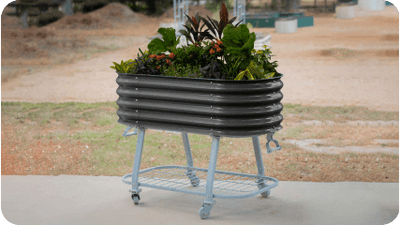








































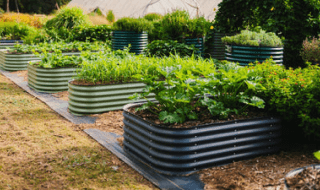
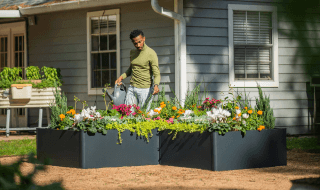
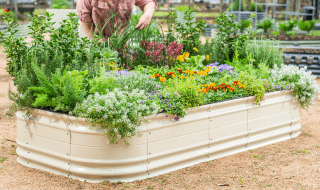
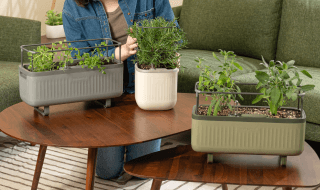
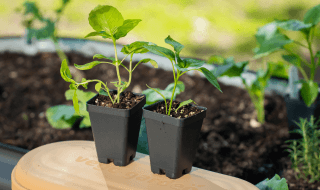
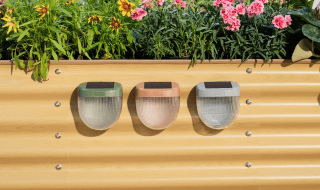
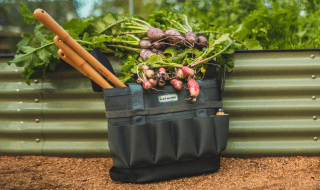
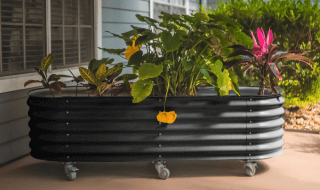





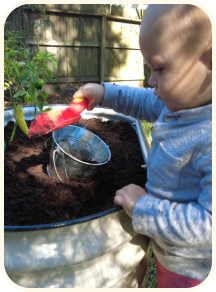

Leave a comment